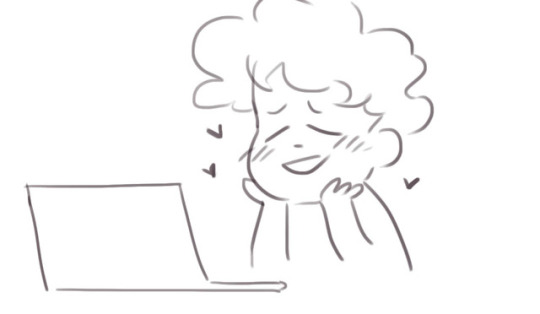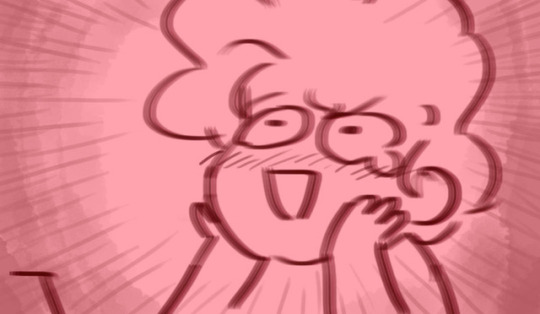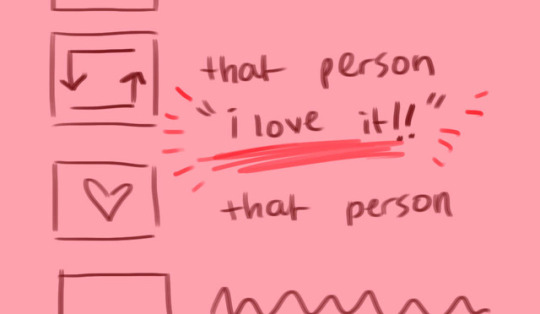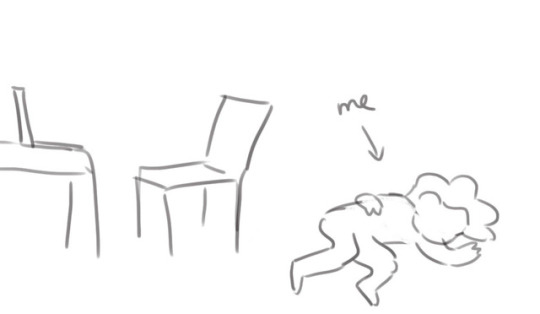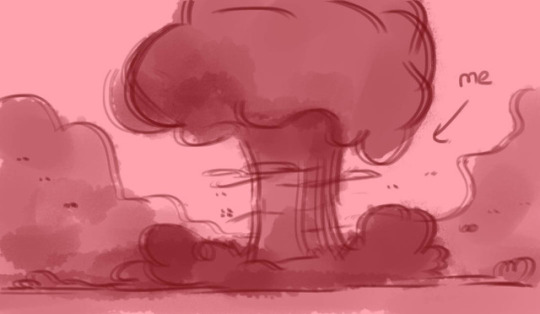Text
more fantasy gripes: i actually despise that the measure of whether or not you’re a good worldbuilder™ is based on how much irrelevant, extraneous detail you put into your books rather than whether or not your world is engaging, “believable” and immersive. i mean, so what if i don’t want to spend years of my life painstakingly detailing every past monarch’s favourite food or eye colour. why is that relevant?? why is that important?? what does this add to the story?? i think a lot of fantasy would be greatly improved if it wasn’t pages full of men wanking off about the boring minutiae of some local lord’s flag that will only ever appear once in the story and never again.
905 notes
·
View notes
Photo

Just started working on the sequel for my first novel Whispers in His Ears the other day, and this is my favorite little bit of ‘WTF’ from chapter one without giving too much away.
4 notes
·
View notes
Text
The Blank Space Series: Horror/paranormal series set in a fictional small town in Oregon. Asonica: A (planned to be) several book erotica/paranormal/fantasy/monster people series. Basically a paranormal fantasy with lots and lots of sex. Various Short Stories: Mostly erotica.
On the hunt for new mutuals!
With 2020 just a few days away, I’d love to meet some new mutuals* in the writeblr community… Which means that the hunt is on (+boosts are welcome):
If you’re an active writeblr and interested in getting to know each other’s works, please reblog this post!
Because I realize that not every WIP is for everyone, here’s a quick description of each of my ongoing original projects (with links out to my WIP summaries):
Devida & Goliath is an Edwardian steampunk adventure set in the British Raj and other imperial holdings
Retrocognition is a paranormal thriller (and political murder mystery!) set in modern day Reno, Nevada
The Blue Jay is a Prohibition-era crime story (featuring a light/dark pairing) set in San Francisco, California
A Shield of Bones is a war-time period drama about a Muslim Viking warrioress set in 9th century Western Europe
The Vizier’s Apprentice is a short 19th century retelling of the original One Thousand and One Nights story frame
Enthralled is a short (and steamy) space opera that grapples with colonization, organized crime, and (soul mate) magic
All of my works are inspired by my personal identities as a happily-married Muslim academic of color with an unquenchable thirst for science, math, history, and adventure. (I also happen to be a multimedia creator, in that much of my writing is accompanied by music, graphics, or art. More info here!)
In your reblog, feel free to tell me about your work, yourself, and whether you think we’d be compatible! I love reading just about any genre, so I plan to follow back anyone who’s interested in becoming mutuals.
*As many around these parts are aware, reviewing and reblogging other people’s work is very important to me – but two-way interaction makes this (occasionally monumental) task more manageable. Check out my review and reblog tag to get a sense of what kinds of support I lend to my lovely mutuals!
92 notes
·
View notes
Text
if you would be so kind as to reblog this if you feel insecure about your writing skills.
484K notes
·
View notes
Text
*sticks my leg in the air* give me attention
324K notes
·
View notes
Photo






Support me on Patreon for $1+ and get access to tons of sketchbook pages, phone backgrounds, and animated illustrations!
[Patreon] - [Store] - [Commissions] - [ko-fi] - [Twitter] - [Instagram]
85 notes
·
View notes
Conversation
So this just happened...
Husband: You writing smut again?
Me *feeling cornered*: ...Y-Yeah?
Husband *with a smile*: Cool.
8 notes
·
View notes
Note
Hi! I have a very old story with a pairing that I quite enjoyed back in the time. Because some things didn't add up I decided to rewrite it. So I read a chapter, rewrite it and... My old action scenes were very detailed, fast paced and nice to read. Nowadays I write very introspective and don't focus on the outside as much. That makes my action scenes boring. Also I was much more eloquent. (Compare: "felt like his larynx would burst" and "couldn't breath") How do I reclaim parts of my old style?
Hi! This is, yeah, this is important. I’m so glad you wrote me. Lemme see…
How to Write Like You Used to, Before You Learned Stuff that Fucked Up Your Natural Creative Flow and Turned Your Writing into Boring, Stilted Garbage
Ok, that’s maybe a little dramatic, but hear me out. Lots and lots of writers start out doing pretty awesome, interesting stuff, both on the prose-level and the story-level. Then they decide to learn more about writing, or they get some “feedback” from readers or betas, or god forbid they go to a critique group or something and then they start second-guessing the shit out of themselves. The first thing that happens is they start to dislike writing, an activity that used to bring much joy. The next thing that happens, usually much later, is that they look back at some old stuff they wrote and realize it was way better, but have no idea how to get their groove back.
I know because it happened to me. Here’s what I did to reclaim my old writing self. Hopefully some of these techniques will work for you, too.
Forget everything you’ve learned about how you’re “supposed” to write.
Like, everything. Plotting, characters, setting, sentence structure, world building, e-v-e-r-y-t-h-i-n-g.
Prioritize feeling good.
Write how it feels good to write. Do run-on sentences feel good? Use ‘em. Does writing a 10-page description of a teacup turn you on? Do it. You can edit it later. But if you don’t write something that excites you at the outset, you’ll have nothing fun or interesting to work with when you do get to the editing stage. I talk more about this concept here.
Write for yourself.
Don’t worry about whether anyone else will like it. Write what you like, how you like. Be your own #1 fan.
Write fast.
The faster you write, the less time you have to think. The less time you have to think, the more you’ll be able to access your natural way of writing instead of forcing yourself to write how you think you “should.”
Don’t show your early drafts to anyone.
That’s your baby. Keep it safe. Getting feedback (even if it’s positive) on your writing too early in the process can kill your creative spark. Take the time to get intimate with your own work and develop it into something that won’t break under the weight of other people’s opinions before you put it out there. Remember: Your relationship to your writing is the most important thing. Nurture it!
Trust yourself.
I’m not saying not to take feedback or constructive criticism into account at some point. I’m also not saying not to try to learn how to be a better writer. I’m saying trust what turns you on. Trust your intuition. Trust that there’s something special there. Trust that eventually someone else will see that, too. I wrote this post after I got a piece published that I’d stood by for years, even after a ton of people told me it was weird and that they “didn’t get it.” Basically, in the words of a writer friend of mine, if you don’t back yourself up, how the fuck can you expect anyone else to do it? Be your own best ally.
Hope this helps!
//////////////
The Literary Architect is a writing advice blog run by me, Bucket Siler. For more writing help, check out my Free Resource Library or get The Complete Guide to Self-Editing for Fiction Writers. xoxo
1K notes
·
View notes
Text
Resources For Describing Emotion
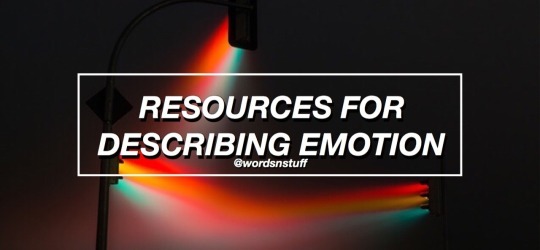
Emotions
Without Making Your Character Feel Too Self Aware
Showing Emotion Without Telling About It
Emotions Associated With Body Language
Telling Readers What The Character Doesn’t Want To Show
Hiding Emotions
Expressing Cardinal Emotions: Masculine vs. Feminine
Writing Extreme Emotion Without Melodrama
Specific Emotions
Conveying Shock
Conveying Embarrassment
Conveying Disappointment
Conveying Love/Attraction
Conveying Annoyance
Conveying Relief
Conveying Uncertainty
Conveying Impatience
Conveying Shame
Conveying Resentment
Conveying Panic
Conveying Guilt
Conveying Desperation
Conveying Sarcasm & Verbal Disrespect
Conveying Confusion
Conveying Stubbornness
Conveying Frustration
Conveying Indifference
Conveying Indignation
Conveying Confidence & Pride
Conveying Smugness
Conveying Enthusiasm
Conveying Curiosity
Conveying Hopefulness
Conveying Unease
Conveying Reluctance
Conveying Worry
Conveying Humility & Meekness
Conveying Happiness & Joy
Conveying Amusement
Conveying Disgust
Conveying Resignation
Conveying Jealousy
Conveying Anticipation
Conveying Contentment
Conveying Defeat
Conveying Excitement
Conveying Fear
Conveying Hatred
Conveying Hurt
Conveying Being Overwhelmed
Conveying Sadness & Grief
Conveying Satisfaction
Conveying Somberness
Conveying Sympathy & Empathy
Conveying Wariness
Conveying Defensiveness
Conveying Desire
Conveying Doubt
Conveying Energy
Conveying Exhaustion
Conveying Hunger
Conveying Loneliness
Conveying Physical Pain
Emotional Wounds
A Role Model Who Disappoints
A Sibling’s Betrayal
A Speech Impediment
Becoming a Caregiver at an Early Age
Being Bullied
Being Fired or Laid Off
Being Held Captive
Being Mugged
Being Publicly Humiliated
Being Raised by Neglectful Parents
Being Raised by Overprotective Parents
Being So Beautiful It’s All People See
Being the Victim of a Vicious Rumor
Being Stalked
Being Trapped in a Collapsed Building
Being Unfairly Blamed For The Death of Another
Childhood Sexual Abuse (by a family member or known person)
Discovering One’s Parent is a Monster
Discovering One’s Sibling was Abused
Experiencing a Miscarriage or Stillbirth
Failing At School
Failing To Do The Right Thing
Financial Ruin Due To A Spouse’s Irresponsibility
Finding Out One’s Child Was Abused
Finding Out One Was Adopted
Getting Lost In a Natural Environment
Growing Up In A Cult
Growing Up in a Dangerous Neighborhood
Growing Up In Foster Care
Growing Up In The Public Eye
Growing Up In The Shadow of a Successful Sibling
Growing Up with a Sibling Who Has a Chronic Disability or Illness
Having Parents Who Favored One Child Over Another
Having To Kill Another Person To Survive
Infertility
Infidelity (emotional or physical)
Losing a Limb
Losing a Loved One To A Random Act of Violence
Making a Very Public Mistake
Overly Critical or Strict Parents
Physical Disfigurement
Rejection By One’s Peers
Telling The Truth But Not Being Believed
The Death of a Child On One’s Watch
Victimization via Identity Theft
Watching A Loved One Die
Wrongful Imprisonment
Spending Time In Jail
Suffering From a Learning Disability
Motivation
Achieving Spiritual Enlightenment
Avoiding Certain Death
Avoiding Financial Ruin
Beating a Diagnosis or Condition
Being Acknowledged and Appreciated by Family
Being a Leader of Others
Being the Best At Something
Caring for an Aging Parent
Carrying on a Legacy
Catching The Bad Guy or Girl
Coming To Grips With Mental Illness
Discovering One’s True Self
Escaping a Dangerous Life one Doesn’t Want
Escaping a Killer
Escaping a Widespread Disaster
Escaping Confinement
Escaping Homelessness
Escaping Invaders
Finding Friendship or Companionship
Finding a Lifelong Partner
Having a Child
Helping a Loved One See They Are Hurting Themselves and Others
Obtaining Shelter From The Elements
Overcoming Abuse and Learning To Trust
Overcoming Addiction
Protecting One’s Home or Property
Pursuing Justice For Oneself or Others
Realizing a Dream
Reconciling with an Estranged Family Member
Rescuing a Loved One From a Captor
Restoring A Name or Reputation
Righting a Deep Wrong
Seeking Out One’s Biological Roots
Stopping an Event From Happening
Trying Again When One Has Previously Failed
Support Wordsnstuff!
Request A Writing Help Post/Themed Playlist/Writing Tips!
Send Me Poetry To Feature On Our Instagram!
Receive Updates & Participate In Polls On Our Twitter!
Like us and share on Facebook!
Read More On Our Masterlist & See our Frequently Asked Questions!
Tag What You Want Me To See With #wordsnstuff!
Participate in monthly writing challenges!
108K notes
·
View notes
Text
Yes, I do teach creative writing: your opening scene
The opening scene is the most important piece of your novel. This scene determines whether your reader is pulled in or puts the book down. Here are some important do’s and don’ts.
DO write it as a scene, not a data dump. You may have a fantastic premise, a marvelous alternate history or post-apocalyptic world or magical realism to die for, but if you don’t engage your reader in an actual scene, you will bore them.
DO write a scene that immediately introduces a character that the reader can root for. Yes, I know Stephen King has had great success introducing victims that are then shortly afterward killed off. That’s a horror trope and we expect it. But if you are caught up in world-building and haven’t dreamed your way into a character who is worth following through 100,000 words of writing, your story is pointless. I have read many pieces of fiction by would-be writers who can’t grasp this essential concept, and without exception, they fail to engage the reader.
DO introduce the stakes right away. In case that’s a challenge that needs some exposition to develop, create some immediate stakes (a life threat works) that keep the tension high and the reader engaged until you can lay out the larger stakes.
DO begin in medias res, which means “in the middle of things.” Most beginning fiction writers make the mistake of starting too early in the plot. Meet the monster on page 1.
DON’T include a flashback in the first chapter. Work on a scene, which means time is NOT compressed. It should include dialog, action, description, setting, and interior monolog. Keep everything happening within that scene for at least the first chapter. You can bring in a flashback in Chapter Three.
DON’T shift points of view within a single chapter. Let the reader establish a strong bond of interest (even if it’s with a POV villain) over the course of a whole chapter.
DON’T open the story with your character waking up unless it’s because she’s got a gun in her face (or a knife to her throat – you get what I mean). We don’t need to follow a character through their mundane daily routine.
DON’T be coy. Beginning writers often have this idea that they need to hold back on revealing all their secrets – what’s in the box, who’s behind the curtain, where they’re going next, etc. Their well-meant plan is to slowly reveal all this over several chapters. Trust me on this one: tell your readers instead of keeping it a mystery. You WILL come up with more secrets to reveal. Your imagination is that good. Spill it now, and allow that revelation to add to the excitement.
30K notes
·
View notes
Text
You, a demon, have befriended someone.
They are the best friend you have ever had in your long long life and you love them more than you thought you could ever love a human.
The only issue is that you haven’t told them what you are. The later it gets, the harder it becomes to tell them, and the easier it gets for them to figure it out on their own, but you are worried that they will be terrified of you and never want to see you again once they know.
62K notes
·
View notes
Text
THINGS WRITERS NEED TO HEAR
you are allowed to take a break. you don’t have to write if you don’t feel like it.
everyone has their own pace. it doesn’t matter if you write one page or ten pages a day, you are still a writer.
your first draft is going to suck. every first draft or every book has sucked. i’ll get better and better as you edit. that’s what editing is for, making your work actually good.
experiment. try out new routines, new styles, new genres. it’ll never harm you. you’ll gain experience and become a better writer. you’ll understand what suits you and what doesn’t.
you don’t need publishing to be a writer. publishing is just an option but if you don’t want to you can just keep your writing to yourself.
if you write, then you’re a writer. no matter how much experience you have, what genre you write, if you are published or not. you are a writer.
everyone is different. everyone has a different style so find your own and rock it. search for inspiration but ultimately focus on what allows you to express your ideas in the best way possible.
you are doing great. no matter how productive you are, how much you’ve written, how fast you write. you are gonna achieve your goal and it’s gonna feel so good.
27K notes
·
View notes
Text
Small physical things that give your characters personality
How they smile
What their “tell” is for lying
Posture
Volume of speech, if they’re verbal
Nervous tics
How much eye contact do they make
In a group conversation, how close do they stand to others? Are they off to the side just listening and occasionally speaking or are they right next to people?
When standing, what do they do with their hands? Talk with their hands, cross their arms, put hands in pockets, prop up against the wall, etc
The sound of their footsteps
Nonverbal greetings: do they wave, nod, hug, glare, punch, high five, something else?
How do they get others’ attention? Raise hand, clear throat, etc
32K notes
·
View notes

